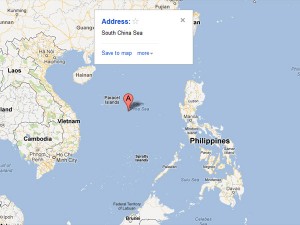China vows to implement sea ‘code of conduct’ with ASEAN

Chinese Foreign Ministry spokesman Hong Lei said maritime conflicts should be resolved in accordance with historical facts and all international laws including the United Nations Convention of the Law of the Sea (UNCLOS).
“The Chinese side is willing to work together with the ASEAN members to implement the Declaration on the Conduct of Parties in the South China Sea (DOC) comprehensively and effectively,” Chinese Foreign Ministry spokesman Hong Lei was quoted by Xinhua, China’s news agency, as saying.
This came after the Association of Southeast Asian Nations belatedly agreed Friday on a common statement on how to handle conflicting territorial claims in the West Philippines Sea.
The new statement calls in general terms for implementation of ASEAN-promoted principles for peaceful resolution of maritime disputes, including avoiding use of force, resolving the conflicts in accordance with international laws, and an early signing of the Declaration on the Conduct of Parties in the South China Sea.
Hong said as a signatory to the UNCLOS, China attached importance to safeguarding the principles and mission of the Convention.
Article continues after this advertisementHong said UNCLOS sought to establish a legal order for the seas and oceans “with due regard for the sovereignty of all States,” and it neither served as an international treaty to address disputes over territorial sovereignty between states nor as evidence used to judge over the disputes.
Article continues after this advertisementThe countries concerned should address the disputes over the maritime demarcation in the South China Sea, after the land disputes have been resolved, in accordance with historical facts and all international laws including UNCLOS, he added.
“China attaches importance to its ties with the ASEAN,” Hong said, adding the country is committed to promoting friendly neighborhood and reciprocal cooperation with the ASEAN to push ahead with the cooperation in East Asia with joint efforts.
The spokesman said China and ASEAN shared common interests and responsibilities in keeping Asia’s development and maintaining regional peace and stability against the backdrop of the ongoing international financial crisis.
“The two sides should continue to promote their strategic communication in pursuit of a reciprocal and win-win situation, with mutual respect and trust in mind as well as handle the relationship between the two sides from strategic and long-term perspective,” he added.
Various longstanding disputes involving China, the Philippines, Vietnam, Taiwan, Malaysia and Brunei straddle busy sea lanes that are believed to be rich in oil and gas deposits. Many fear the disputes could spark a violent conflict.
China claims sovereignty over nearly all of the resource-rich sea, which is home to vital shipping lanes, but Asean members the Philippines, Vietnam, Malaysia and Brunei have overlapping claims in the area.
The six-point agreement, which does not give details about specific incidents, follows intense diplomatic efforts by Indonesian Foreign Minister Marty Natalegawa, who visited Hanoi and Manila on Wednesday followed by Phnom Penh.
Divisions over the territorial disputes with Beijing earlier prevented ASEAN from issuing its customary joint statement at the conclusion of a meeting in Phnom Penh on July 13, an unprecedented occurrence in the bloc’s 45-year history. With reports from China Daily-Asia News Network, Associated Press, Agence France-Presse
For comprehensive coverage, in-depth analysis, visit our special page for West Philippine Sea updates. Stay informed with articles, videos, and expert opinions.